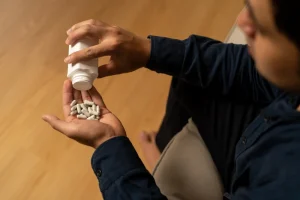
In fact, there were more than 12 million prescriptions filled for Eliquis in 2018. This newer medication has nearly caught up to warfarin—also known by its brand name Coumadin—a classic blood thinner that’s been used since 1954. Use of this website and any information contained herein is governed by the Healthgrades User Agreement.
Side effects explained
You may have nosebleeds during your treatment with Eliquis. But in studies, nosebleeds were not a commonly reported side effect in people taking Eliquis. For more information about this side effect, talk with your doctor or pharmacist. It’s possible for Eliquis to cause kidney-related side effects.

Alternatives for preventing blood clots and stroke in people with AFib
So, your doctor may want to reverse the effects of Eliquis to lower your risk of bleeding with surgery. Severe or life threatening bleeding with Eliquis can be reversed. This can be done with a treatment called coagulation factor Xa (Andexxa). It works by attaching to Eliquis in your body and keeping Eliquis from working. If you need to receive an epidural or spinal injection while taking Eliquis, your doctor will watch for blood clots in your spine or brain.

Eliquis for preventing DVT that could lead to PE after a hip or knee replacement
- If you’ve had an allergic reaction to Eliquis or any of its ingredients, your doctor will likely not prescribe Eliquis.
- They offer a number of benefits over warfarin, but they do have some disadvantages.
- For this reason, doctors may prescribe a lower dosage of Eliquis for older people in certain situations.
- This may lead to higher levels of Eliquis in your body, which could raise your risk of bleeding.
- You can prepare for your appointment by viewing Healthgrades’s appointment guide for Afib, hip replacement, or knee replacement.
- Eliquis may not be right for you if you have certain medical conditions.
By affecting serotonin and norepinephrine, SSRIs and SNRIs can prevent platelets from grouping together. Eliquis works by blocking the action of a certain clotting factor called factor Xa. By blocking the action, Eliquis makes your blood less likely to clot or helps prevent a blood clot you currently have from getting larger. Thrombolytics are typically used in emergency situations, such as dissolving a blood clot that’s affecting the brain or heart. NSAIDs can prevent platelets (a type of red blood cell) from clumping together to form blood clots.
If you need to take a medication to treat seizures, talk with your doctor about safe treatment options. If you need to take a pain reliever or any other new medications blood thinners and alcohol during your Eliquis treatment, talk with your doctor or pharmacist. Certain over-the-counter cold and flu medications contain ibuprofen or naproxen.
Additionally, informing your healthcare provider about all the medications and supplements you’re taking is vital for safe and effective treatment. Recognizing and addressing alcohol misuse is also essential. Remember, when it comes to your health, it’s better to be safe than sorry. The dosage is based on your medical condition, age, weight, response to treatment, and other medications you may be taking. Be sure to tell your doctor and pharmacist about all the products you use (including prescription drugs, nonprescription drugs, and herbal products). If you are taking apixaban to prevent blood clots from forming after surgery, the length of treatment is based on the type of surgery that you had.

Eliquis for preventing blood clots and stroke in people with AFib
Eliquis may not be the right treatment option for you if you have certain medical conditions or other factors affecting your health. By dissolving the clots, thrombolytics also increase your risk of bleeding. However, both alcohol and Eliquis can increase your risk of bleeding.
Common questions about Eliquis and interactions
Your doctor may recommend a different type of antidepressant. If you drink alcohol, talk with your doctor about how much, if any, is safe for you to drink while you’re taking Eliquis. However, drinking excessive amounts of alcohol may not be safe while taking this medication. If you have any symptoms of serious bleeding, call your doctor right away. If your symptoms feel life threatening, call 911 or your local emergency number.
- However, certain over-the-counter antacids contain aspirin, which is an antiplatelet drug.
- If you have questions about renal dosing for Eliquis or the dosage for older people, talk with your doctor.
- After hip or knee replacement surgery, you have a higher risk of getting a DVT or PE.
- For preventing blood clots and stroke in AFib, Eliquis is meant to be used as a long-term treatment.
(The two substances may prevent blood from clotting.) This means that drinking alcohol while taking Eliquis could increase your risk of bleeding further. Eliquis starts working within 3 to 4 hours after you take your first dose. However, you need to take it twice every day to make sure there’s always enough medication in your body to help stop blood clots from forming. Eliquis prevents your blood from clotting, and alcohol can also have this effect. Therefore, drinking excessive amounts of alcohol while you’re taking Eliquis could increase your risk of bleeding. For preventing blood clots and stroke in AFib, Eliquis is meant to be used as a long-term treatment.

